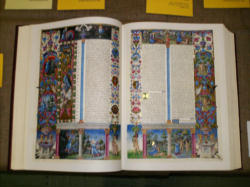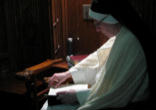Idleness is the enemy of the soul; and therefore the brethren ought to be employed in manual labor at certain times, at others, in devout reading … On Sunday also let all devote themselves to reading, except those who are appointed to the various functions. But if anyone should be so careless and slothful that he will not or cannot meditate or read, let some work be given him to do, that he may not be idle. (Rule of Saint Benedict, Chapter 48)
In the Rule of Saint Benedict, the beloved Father of Western Monasticism emphasizes the importance of daily lectio divina, or sacred reading, as a primary means of growing in deeper intimacy with the Lord of Sacred Scripture. Sunday is a day even more particularly devoted to such a practice, for Sunday is the great holy day when we as Christian faithful should seek to encounter the face of God most of all in our Sabbath rest. God calls us to preserve the Sabbath as holy, a time when we seek to grow closer to God in communion with the Christian faithful, especially with our families and other loved ones whom we hold dear to our hearts.
Lectio divina is a slow, prayerfully meditative reading of the Bible, in a relaxed manner over a significant period of time (at least 30 minutes), in a place that is free from any distractions with the goal of growing more intimately close to our Lord through his Word. Praying through lectio divina is especially powerful in front of the Blessed Sacrament, where also we may encounter our Lord Jesus in his inestimable Love.
It is worth examining a selection of our Holy Father Pope Benedict XVI’s statements concerning this ancient monastic practice, which is said to have originated with Saint Benedict in the 5th century and Pope Saint Gregory the Great in the late 6th century, founded upon earlier Hebrew and Greek practices. Pope Benedict XVI has spent considerable time over the course of his pontificate catechizing the Christian faithful on the practice of lectio divina, even leading the people of God in such practice in select audiences over the past few years.
In his message to the youth of the world “On the Occasion of the 21st World Youth Day” (9 April 2006), our Holy Father urges the young to “become familiar with the Bible, and to have it at hand so that it can be your compass pointing out the road to follow. By reading it, you will know Christ. Note what Saint Jerome said in this regard: ‘Ignorance of the Scriptures is ignorance of Christ’.”
Benedict XVI highlights that lectio divina embraces a spiritual journey composed of four stages: Lectio, which is “reading and rereading a passage from Sacred Scripture and taking in the main elements”; Meditatio, a “moment of interior reflection in which the soul turns to God and tried to understand what his Word is saying to us today”; Oratio, when we “linger to talk with God directly” in direct dialogue with God; and finally Contemplatio, which “helps us to keep our hearts attentive to the presence of Christ” in silent contemplation. In this manner, our Holy Father emphasizes, “reading, study and meditation of the Word should then flow into a life of consistent fidelity to Christ and his teachings.”
 In his address to participants of the international congress organized to commemorate the 40th anniversary of the Dogmatic Constitution on Divine Revelation ‘Dei Verbum’ (16 September 2005), Pope Benedict shares that such “diligent reading of Sacred Scripture accompanied by prayer brings about that intimate dialogue in which the person reading hears God who is speaking, and in praying, responds to him with trusting openness of heart (cf. Dei Verbum 25). The beloved Pontiff then enunciates with great enthusiasm, “If it is effectively promoted, this practice will bring to the Church – I am convinced of it – a new spiritual springtime.”
In his address to participants of the international congress organized to commemorate the 40th anniversary of the Dogmatic Constitution on Divine Revelation ‘Dei Verbum’ (16 September 2005), Pope Benedict shares that such “diligent reading of Sacred Scripture accompanied by prayer brings about that intimate dialogue in which the person reading hears God who is speaking, and in praying, responds to him with trusting openness of heart (cf. Dei Verbum 25). The beloved Pontiff then enunciates with great enthusiasm, “If it is effectively promoted, this practice will bring to the Church – I am convinced of it – a new spiritual springtime.”
Anyone who has read Pope Benedict XVI’s first two volumes of Jesus of Nazareth notices immediately that our Holy Father “does not only talk the talk, but he walks the walk” when it comes to practicing lectio divina. Both books are evidence of the immense fruit that transpires when meditating carefully on God’s divine Word. These volumes comprise profound meditations on the Jesus of Sacred Scripture, in a living encounter where Pope Benedict succeeds in helping us to accompany him as he makes his personal search “for the face of the Lord”.
In the first volume of Jesus of Nazareth, the Holy Father introduces to us to the use of canonical exegesis that, working hand in hand with the historical-critical method of examining Scripture, allows the words of the Bible open up to us as relevant in our modern day. We see that Jesus Christ is the “key to the whole” and learn from him “how to understand the Bible as a unity, presuppos[ing] a prior act of faith”. In canonical exegesis, we “read … the individual texts of the Bible in the context of the whole”, carrying forth historical-critical interpretation in an organic manner “toward becoming theology in the proper sense”.
In historical-critical interpretation, what is sought concerns the “precise sense the words were intended to convey at their time and place of origin”, but certainly the Word has deeper value than simply for that time and place through the course of our faith history. Benedict XVI elaborates: “The Scripture emerged from within the heart of a living subject – the pilgrim people of God – and lives within this same subject” (xix-xx). It is such methodology that guides our Holy Father in his interpretation of Jesus in the New Testament, a form of examination that trusts the Gospels that “the Jesus of the Gospels … is a historically plausible and convincing figure” (xxii).
Pope Benedict’s approach finds deeper root in his earlier role as President of the Pontifical Biblical Commission when it released its landmark document in 1993 guiding the Christian faithful in its understanding Sacred Scripture, The Interpretation of the Bible in the Church. Then Cardinal Joseph Ratzinger highlighted in his introduction to the document that “each age must in its own way newly seek to understand the sacred books”, but in light of its being human word and God’s Word together, “in the singularity of historical events and the eternity of the everlasting Word, which is contemporary in every age”.
Within this same document, the Pontifical Biblical Commission highlights the importance of the canonical exegetical approach, which had originated in the 1970s out of concern that the historical-critical method at times experienced considerable difficulty arriving at truly theological conclusions. Consequently, it was determined that the theological work of interpreting Sacred Scripture would enjoy more success “by beginning from within an explicit framework of faith: the Bible as a whole,” interpreting each Biblical text in light of the entire Scriptural canon “as received as the norm of faith by a community of believers” in order “to arrive at a presentation of Scripture truly valid for our time”, thus compensating for the weaknesses discovered in the historical-critical method.
The Pontifical Biblical Commission underscores a particularly important point for all Christians to keep in mind when seeking to interpret the meaning of Sacred Scripture: “It is the believing community that provides a truly adequate context for interpreting canonical texts. In this context, faith and the Holy Spirit enrich exegesis; Church authority, exercised as a service of the community, must see to it that this interpretation remains faithful to the great tradition which has produced the texts” (cf. Dei Verbum 10).
In other words, in order to arrive at the most authentic interpretation of God’s Word, we must guard against the error of reading our own personal interpretation into the Biblical text (known as eisegesis) when it clearly is not consistent with the traditional deposit of our Faith. The Roman Catholic and Orthodox Churches maintain that the Bible can be understood correctly only through the lens of Holy Tradition as passed down through the centuries.
May we ever seek to encounter our Lord more intimately through daily meditation upon His sacred Word, following the excellent example of our Holy Father Pope Benedict XVI as he testifies to his vibrant faith in the Jesus of Nazareth series. His third volume on the infancy narratives on Jesus couldn’t come soon enough! May these precious works of faith lead us ever more intimately in communion with God, giving us many opportunities to encounter the face of the Lord in Christ Jesus many times over!


